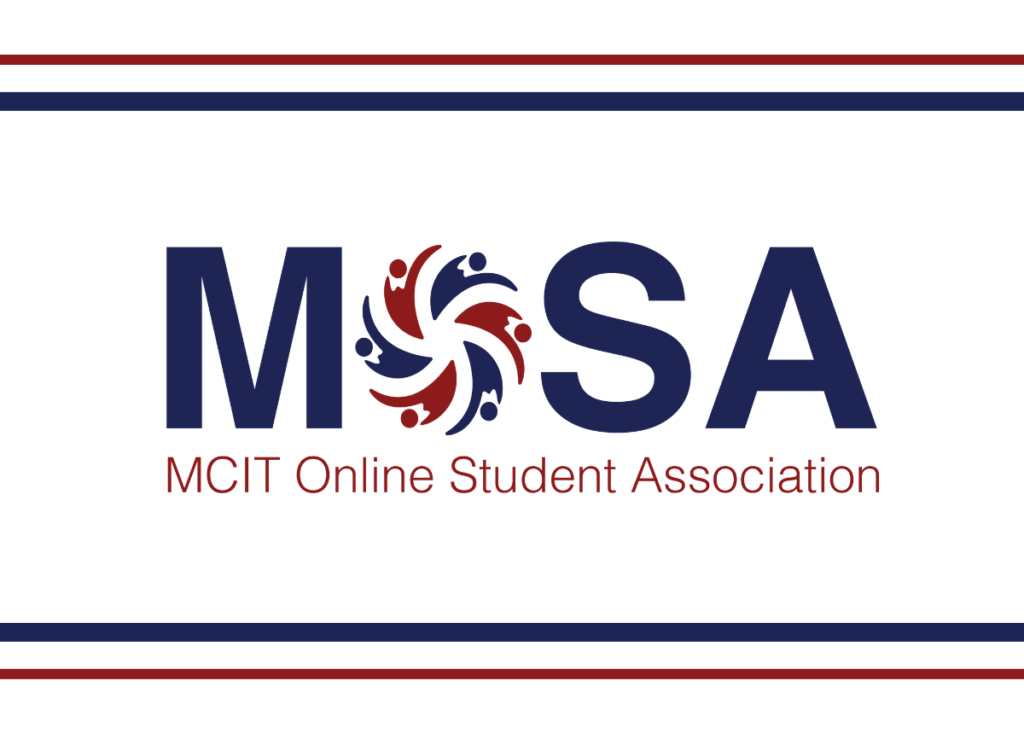Five Years of MOSA
Ever since the MCIT Online degree was first launched five years ago, a strong sense of community has become a hallmark of the program. In large part, that’s because of the ongoing efforts of the MCIT Online Student Association (MOSA), which have been instrumental to the program’s delivery of student support and engagement.
MOSA was founded in 2019, soon after Penn Engineering embarked on its inaugural journey into the world of online learning with the debut of its online Master of Computer and Information Technology (MCIT Online) degree program. The program was designed with the goal of expanding access to Penn’s world-class engineering education, but administrators also aimed to challenge the norms of online learning. A big part of this was creating a genuine community experience – and that is where MOSA came in.
“A group of MCIT Online students came together to organize a student body to represent the larger student body at large,” said Kris Stern, MCIT Online Fall ‘22 Cohort, who currently serves as the Director of Operations for MOSA’s Executive Board. “MOSA aims to empower the student community … by liaising amongst the student body, university administration, and faculty. MOSA makes sure that the students’ voices are heard.”

Not only does MOSA provide students with a means through which to engage with Penn Engineering faculty and staff – it also creates pathways for students to forge connections with their fellow classmates and peers. These opportunities for relationship building are often referenced by students and alumni as key factors that distinguish Penn Engineering from other online graduate programs. “What makes the MCIT program unique is that it offers online students ways to get connected with each other and form smaller communities within the larger student body,” said Derek Chen, MCIT Online Spring ‘23 Cohort, who currently serves as co-president of MOSA.
Chen enrolled with Penn Engineering Online in Spring 2023 after spending time doing research at his local university on genetics projects. While learning how to do computational analysis, he spurred an interest in computer science which led him to apply to the MCIT Online program. He now enjoys all of the academic rigor and renowned educational experience of the University of Pennsylvania from his home in San Jose, California – but studying alongside individuals from around the globe, he found himself seeking a way to build relationships and get to know other students.
“MOSA is one of those avenues where I thought it was a great way to get involved with other students and meet classmates from different backgrounds, different time zones and different walks of life,” says Chen.
MOSA is led by an Executive Board that is comprised of students around the world from a wide variety of personal, professional and academic backgrounds — much like the Penn Engineering Online student body as a whole. Many members, like Chen, join MOSA to meet other lifelong learners in the network and enhance the social component of their master’s degree. “I personally wanted to get involved in a leadership role with MOSA because of my desire to give back to the community,” says Stern. “MOSA’s mission is to develop and foster the MCIT Online student community with programs and events related to education/learning, entrepreneurship/jobs and social fellowship … Our mission has not changed at all in the past five years. Throughout, we have organized many events to help students navigate the MCIT Online program.”

MOSA’s leadership team is organized into committees focusing on areas of engagement:
• Education and Learning
• Entrepreneurship and Jobs
• Fellowship (Social)
• Diversity and Inclusion
• Student Support
During their short – but significant – five year history, MOSA’s extensive assortment of programming has made a large impact on the Penn Engineering Online student experience. The group’s Executive Board organizes regular social gatherings, such as Zoom socials, to give members an opportunity to get to know each other via icebreakers and casual conversations. MOSA also has provided a portfolio of resources to the student body, including a resume bank to support professional development efforts, organized study tips to aid academic pursuits in MCIT courses, and the collection of overall student feedback to be submitted to the University Administration.
“We’ve done blog posts where we invite students to write posts about various topics, technology related or industry related. We’ve also invited professors to speak about topics such as computer science research or their personal experience working in industry,” said Chen. “And every year we’ll host an annual hackathon … which allows students to gain the real-world experience of coding a project, working in teams, building something that they’re proud of and showcasing it on their resume.”
MOSA also recently launched a peer mentorship program where students at the beginning of their MCIT journey are matched with a senior student or alumni as a mentor who can provide academic and professional guidance.
MOSA strives to make mentor – mentee matches based on special interest, career goals and personal identity. Mentors can provide encouragement as well as insights into experiences or perspectives that many other Penn Engineering Online students encounter such as career changes, being a women in tech, and balancing studies with personal and professional commitments.

Another recent accomplishment of note is the development of a new MyMCIT course review website. This resource allows students to rate and share their academic experience in each of Penn Engineering Online’s courses. MyMCIT serves as the successor to a former version of the site, MCIT Central, which the MOSA team spent nearly seven months enhancing and developing with new features and improvements. MOSA was thrilled to unveil the updated platform and is confident that MyMCIT will serve as an important academic tool for students in planning their course schedules.
Here’s a look back at some additional examples of the types of events, programming and resources created by MOSA throughout their first five years:





72 Hours of Hacking
MOSA hosted its first-ever online hackathon for MCIT Online students in August 2019. Over the course of just three days, teams of students collaborated to ideate and build effective apps that met a specific need. In the process, they gained technical skills, learned to work under pressure and forged strong bonds with classmates. The winning app was the NYC Rental Pricer, which uses machine learning to predict rental prices in New York.
Internship Search Webinar
In December 2019, MOSA co-founder and co-president Angela Wen presented the organization’s first career-focused webinar. A biology major in college who entered MCIT Online with no professional experience in tech, Wen secured three internships as a second-year student in MCIT Online. In her webinar, she spoke about her own internship search and offered tips to help other students prepare for interviews and navigate the process.
Winter 2020 Hackathon
MOSA’s second hackathon, in January 2020, took place over nine days, accommodating students with full-time jobs and other personal or professional commitments. Participants logged on from all over the world to collaborate on projects such as a weather app and a Chrome extension supporting MCIT Online. The winning app, Voice, provides a feedback mechanism to enable survey respondents to learn the outcomes of their feedback.
Participants shared reflections on the experience such as, “I stepped into making a UI with Python, something I had never done in any language. The Hackathon gave me an opportunity to learn something new outside of my comfort zone.”
MOSA Dinner Socials @ Lyft
In spring 2020, MCIT Online student Angela Wen hosted several MOSA members at the headquarters of Lyft in San Francisco, where she was an intern. Participants had the opportunity to connect with classmates, tour a booming tech company, and make industry connections.
Data Science Chat
More than 50 MCIT Online students gathered in June 2020 for an online presentation featuring Jon Purnell, V.P. of Data Science at Spectrum Labs. In a wide-ranging conversation, Purnell spoke about his career in tech, what he looks for when hiring data scientists, and bias in data.
From Academia to the Start-Up Industry
In October 2021, MOSA presented a guest lecture by Boon Thau Loo, RCA Professor in the Computer and Information Science Department and Associate Dean for Graduate Programs. In addition to his academic work, Loo has co-founded two technology companies that were acquired successfully. In his online talk, he outlined his pathway from research to successful startup founder and explained how tech concepts studied in MCIT Online courses can play out in industry practice.
Summer of Code
In 2023, more than 100 students participated in MOSA’s largest and longest hackathon to date – Summer of Code. Students spent the entire summer developing their projects and fleshing out concepts. The winning project, VeriCreds, uses blockchain technology to store and verify credentials. Other contending projects included a carbon tracker, an app that encourages people to vote, and a portal that streamlines event coordination.
“As a participant, [Summer of Code] has truly been a very enjoyable experience, especially when weekly peer programming sessions and meetings allow me to learn much from my peers,” said Kris Stern, who served both as a hackathon organizer and a participant. “As an organizer, it was delightful to see participants start from zero programming project experience [and grow] to someone who has a working prototype of a web application under their belt … It was fun and I learned something about blockchain in the process – plus made some friends.”
Spring 2024 Hackathon
In May 2024, teams of 2-4 students from the online MCIT and MSE-DS programs assembled to compete in an open-ended hackathon. Participants were able to utilize any programming language of their choosing to develop a project that fit within any of these themes: AI for Good, Education, Finance, Healthcare
Submissions were judged by Penn Engineering professors Dr. Thomas Farmer and Brandon Krakowsky, but the primary goal of the competition was to learn and build something valuable for their portfolios.Winning projects spanned a variety of topics and functions, including:
- Running Gait Analysis: Identifies and improves weakness in users’ running form
- AiTA: Artificial Intelligence Teaching Assistant
- DevChat: Web-based chat application built for developers
- Simple Regex: VS Code extension; Finds code that obeys an input regex pattern
As MOSA celebrates its fifth anniversary, the leadership team plans to continue looking for new ways to strengthen and expand the organization, valuing input from participating students. “We’re always making improvements based on what we hear,” Chen noted. “We change our programming based on what the student needs are.”
MOSA also makes an effort to offer inclusive programming that brings in students from Penn Engineering Online’s newer degree programs: MSE-DS Online and MSE-AI Online. “We want our programs to be open to everyone,” says Chen.
As MOSA looks towards the next five years and beyond, one thing is clear – their contributions to the Penn Engineering Online community have become a part of the program’s legacy and will continue to enhance the student experience for years to come.
Learn more about Penn Engineering Online’s five year anniversary memories and milestones.
Browse other recent stories from MOSA:
➡ MOSA SUMMER OF CODE: Part 1 & Part 2
➡ HOW I GOT INTO TECH WITHOUT A CS DEGREE
➡ BOOTCAMP VS MCIT
➡ STUDENT COMMUNITY SPOTLIGHT: MCIT Online Student Association
